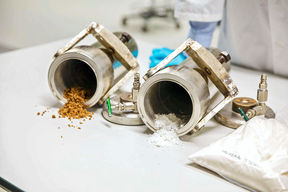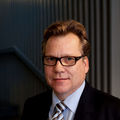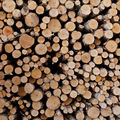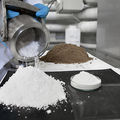Clean Technologies

The responsible use of raw materials and development of Cleantech-processes in harmony with the management and control of industrial environmental load are the most important objectives in the research field we provide. In environmental technology the research focus is on holistic management and control of industrial environmental load to water, air and solids.
Research themes:
Research is divided in three main themes:
- Treatment and reuse of process water
- Development of new processes
- Utilisation of solid side streams
Social aspects of sustainability are taken into consideration through our collaboration in educational development and coordination of joint international projects.
Treatment and Reuse of Process Water
TRPW-theme focuses on purification and reuse of process waters from industry.
We believe that through water quality optimisation the performance of minerals beneficiation processes can be improved, bringing not only financial benefits to the mining operations, but also lessening of the environmental load. Therefore in our research we focus on the effects of water quality on process performance, testing of water quality monitoring tools, advanced data analysis and development of sustainable water treatment processes.
New Processes and Product Development:
NPPD-theme focuses on development of new and sustainable processes and products.
Sustainable Reuse of Solids:
SURE-theme focuses on recycle and reuse of residuals from process industry.
Examples of ongoing research projects:
Käytöstä poistunut puumateriaali kiertoon, Pumaska (2024-2026)
The project aims to boost recycling and extend the lifespan of used wood materials, focusing on construction waste and sawmill by-products. It converts these materials into plant growth media, soil improvers, and other fiber products, enhancing high-value raw material availability. The project conducts practical trials for sorting and processing these wood fractions, analyzing their composition, and calculating recycling effects on carbon emissions. It seeks to co-develop a value chain from waste wood to beneficial use, improve recycling rates, and reduce wood's carbon footprint. The project stakeholders include companies handling demolition wood, sawmills, and businesses using growth media and soil improvers, as well as municipal waste management, universities, and research institutions.
This project is funded from the European Regional Development Fund. The other project participants are University of Eastern Finland and Häme University of Applied Sciences.
Researchers: Antti Koistinen, Solja Lukka
Past projects:
The goal of the project is to find out the suitability of side streams from the Lahti area other than compost and wood ash as raw material for “Putretti”. Fractions that contain fast-dissolving nitrogen that can be used by plants are especially needed. In addition, we are also developing completely new circular economy products in the project.
Researcher Hanna Vanhanen. See more about the project here: https://putretti.blogspot.com/
Project funding from the Päijät-Häme Union and it is part of the Finnish structural fund program of the European Union, the European Regional Development Fund "Sustainable growth and work 2014–2020".
Development of new AaltoCell™ -based fiber applications with Andrtiz Ltd.
Reseacher Annina Lähdeniemi
This project invested in pioneering together with the region's leading companies, Lahti Energia and Labio, by creating a value chain of SMEs and research organizations. The value chain included processes from the development work of organic recycling fertilizer to commercialization of the product. The project will increase the region's know-how, especially of processes in the field of circular economy. At the moment strong knowledge of this field does not exist in the Päijät-Häme region. Aalto University, lead by professor Dahl, will bring this knowledge for the project. Natural Resources Institute Finland (Luke) has been researching a lot of ash fertilization of the forests, and the metals possibly dissolving from the fertilization. The role of Lahti Region Development (LADEC) is to strongly involve region's SMEs already at the beginning of the project and to start the preliminary conversations of the investments of the fertilizer plant. This project will increase the value added of compost and ash, and also enhance the circular economy of the Kujala waste center. Ammonia will be recovered from the process. Lahti Energia is able to utilize the recovered ammonia in its own process.
Researcher: Antti Pietiläinen
Focused on the isolation of process waters completely from the adjacent water systems. This will require development of new methods for optimising and controlling water qualities at each process step. As a bonus, this will also facilitate the recovery of additional valuable constituents.
This project received funding from the European Union’s Horizon 2020 research and innovation programme under grant agreement No 730480.
Researchers: Nóra Schreithofer, Ngoni Mhonde, LE Thi, Tapio Friberg, Hannu Sippola, Anne Penttilä
New sustainable products from AaltoCell™
Researcher Eetu Satosalmi
Aims to improve the mining industry’s water balance management capabilities by providing a new dynamic, predictive water balance solution to the market. This solution helps the mining industry monitor an entire mine site’s water balance in real-time. It provides them with a possibility to create short-term forecasts for a site’s water volumes and water quality in different production and environmental conditions.
The project is financed by EITRawMaterials.
Researchers: Nóra Schreithofer, Tapio Friberg
The “Bridging North to South” project is performed in collaboration with the Centre for Minerals Research (CMR) at the University of Cape Town. Our project aims to outline research protocols for evaluation and implementation of closed water circuits in mineral concentrators, to achieve zero emission plants.
The project is financed by the Academy of Finland.
Researchers: Nóra Schreithofer, Ngoni Mhonde, LE Thi, Tapio Friberg
Research group members:
Related content:
Get to know us: Professor Olli Dahl
Saving the environment via businesses.

Not a drop wasted – AaltoCell™ fibres utilised in a new circular economy project
With funding totalling €240 000, the project aims to make more efficient use of food industry side streams.

What if the world’s cattle munched on Finnish wood?
A new manufacturing method will open entirely new markets for microcrystalline cellulose. It could be used, for example, to enrich animal fodder.

ANDRITZ Oy and Aalto University bring a new biotechnology product to the global market
AaltoCell™ technology allows ecological and fast production of microcrystalline cellulose (MCC).

AaltoCell™ concept successful in international biorefinery competition
The most recent innovations in the field of bioeconomy have been applied in the development of the biorefinery project.






